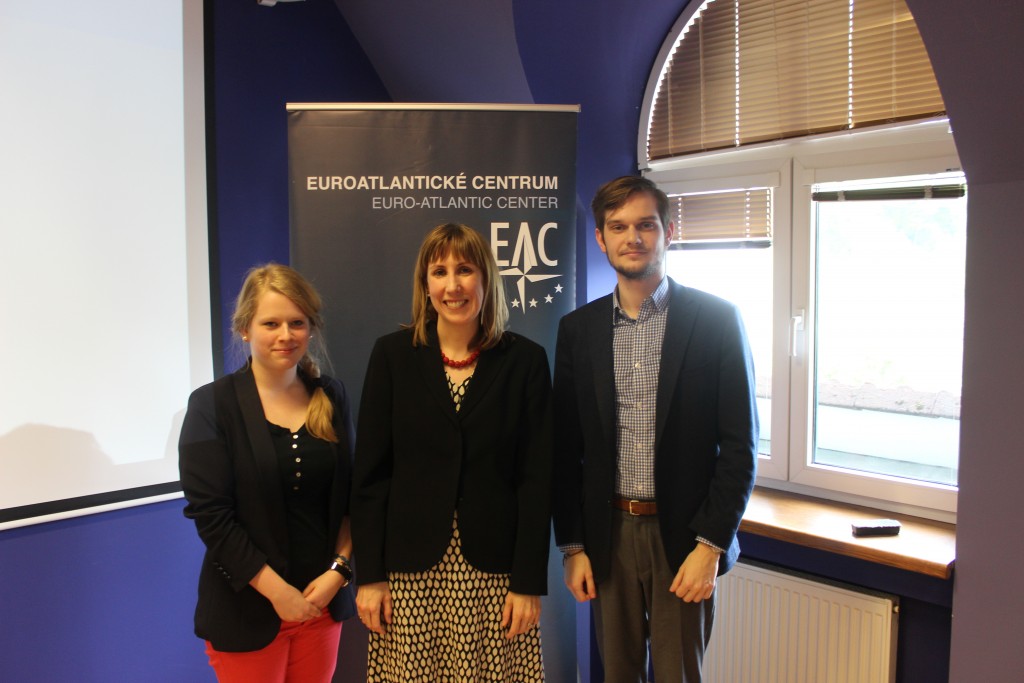 On Monday, 25th April, Euro-Atlantic Center had the honor to host Stephanie Fitzmaurice, Deputy Public Affairs Officer from the U.S. Embassy in Bratislava, on the premises of the Faculty of political sciences and international relations in Banská Bystrica. The main topic of the given lecture was “U.S. Foreign Policy: U.S. Embassy Bratislava priorities”.
On Monday, 25th April, Euro-Atlantic Center had the honor to host Stephanie Fitzmaurice, Deputy Public Affairs Officer from the U.S. Embassy in Bratislava, on the premises of the Faculty of political sciences and international relations in Banská Bystrica. The main topic of the given lecture was “U.S. Foreign Policy: U.S. Embassy Bratislava priorities”.
At the beginning, Ms. Fitzmaurice stressed the importance of Slovakia as a partner and an ally. She explained: “I am very impressed with changes that Slovakia underwent through the years, from being a communist country through its integration to European Union and NATO into being the country with one of the highest GDPs in the region.”
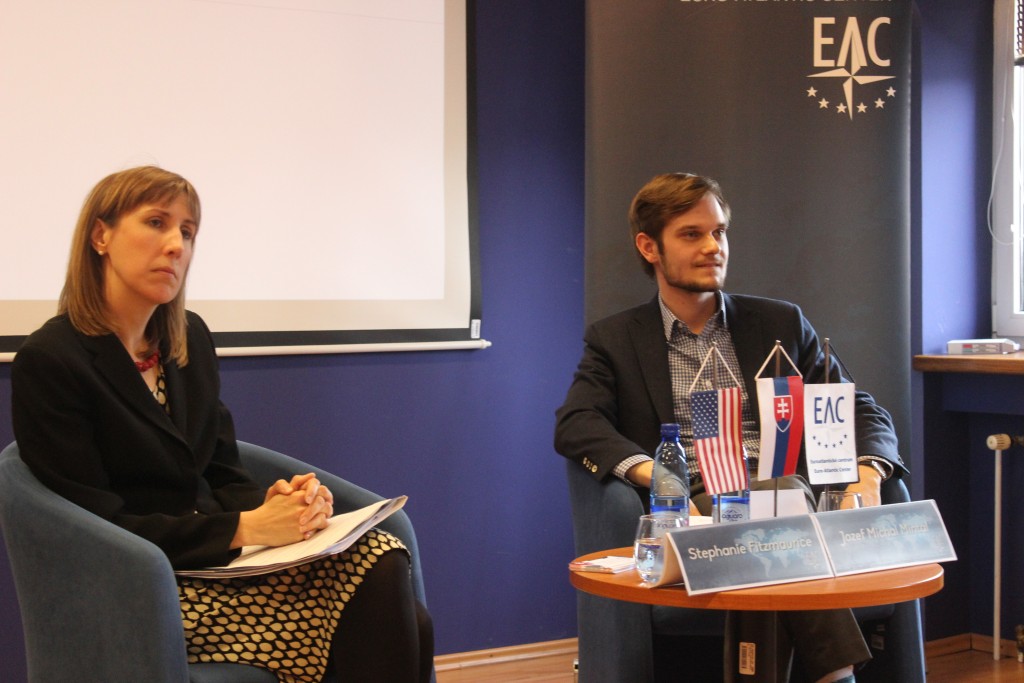 She outlined four main goals of the U.S: Embassy in Bratislava for the upcoming period. First of these goals is the support for Slovakia and its cooperation within the regional institutions. This goal also includes further assistance with the modernization of the army and Slovakia´s support for Ukraine. Their second goal is to assist Slovakia in strengthening its institutions which promote democracy, rule of law and combat corruption and propaganda. U.S. Embassy´s goal is also to support its economy growth and further integration to Euro-Atlantic structures by promoting TTIP. According to Ms. Fitzmaurice Europe and especially Slovakia could greatly benefit from this treaty. Other aspects of foreign policy that they try to promote are the combat against the climate change, assuring sufficient energy and cyber security. The fourth goal introduced by the speaker was the increasing of the active public diplomacy, by talking or giving lectures to wide public, young people and minorities.
She outlined four main goals of the U.S: Embassy in Bratislava for the upcoming period. First of these goals is the support for Slovakia and its cooperation within the regional institutions. This goal also includes further assistance with the modernization of the army and Slovakia´s support for Ukraine. Their second goal is to assist Slovakia in strengthening its institutions which promote democracy, rule of law and combat corruption and propaganda. U.S. Embassy´s goal is also to support its economy growth and further integration to Euro-Atlantic structures by promoting TTIP. According to Ms. Fitzmaurice Europe and especially Slovakia could greatly benefit from this treaty. Other aspects of foreign policy that they try to promote are the combat against the climate change, assuring sufficient energy and cyber security. The fourth goal introduced by the speaker was the increasing of the active public diplomacy, by talking or giving lectures to wide public, young people and minorities.
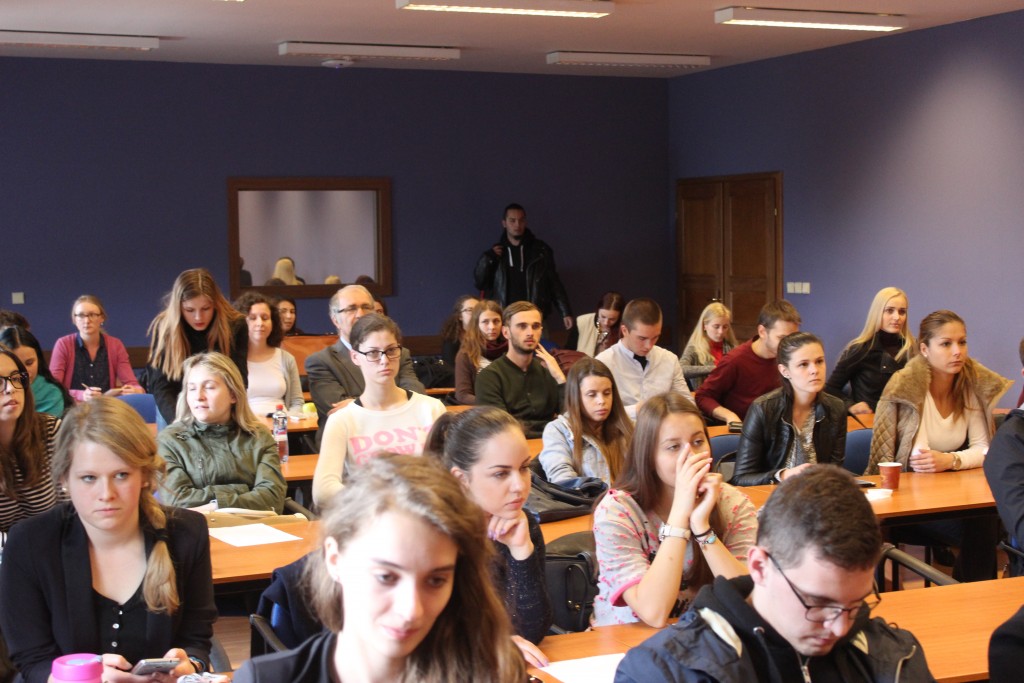 After speaker´s short introduction, the host opened the discussion. One of the first questions was aimed at the different possibilities for students, such as internships or exchange programmes which U.S. Embassy has to offer. Ms. Fitzmaurice explained that they offer numerous non-paid internships all year around which are a great opportunity for students to get some valuable practical experience. She also pointed out the advantages of Work&Travel scheme which offers various summer jobs in the United States for students. Auditorium was very curious about the ongoing TTIP negotiations and the experiences of U.S. society with the GMOs. The speaker stressed that the importance of TTIP lies in its aim to increase standards of the products and not otherwise. Ms. Fitzmaurice dismissed any doubts about harmfulness of GMOs and added that in the open free market nobody will force such products unless there is a demand for them. She also notes that this treaty is very transparent compared to other trade treaties around the world, thanks to so called “reading rooms” where certain government officials are allowed to read negotiated chapters. Another broad topic that the students asked about was the upcoming U.S. elections. Our speaker commented that this year´s election have been very unpredictable and surprising so far, but expressed herself that the most probable candidate for the presidential seat would probably be Hillary Clinton. When asked about the successes of the president Obama, she pointed out the passing of Obamacare
After speaker´s short introduction, the host opened the discussion. One of the first questions was aimed at the different possibilities for students, such as internships or exchange programmes which U.S. Embassy has to offer. Ms. Fitzmaurice explained that they offer numerous non-paid internships all year around which are a great opportunity for students to get some valuable practical experience. She also pointed out the advantages of Work&Travel scheme which offers various summer jobs in the United States for students. Auditorium was very curious about the ongoing TTIP negotiations and the experiences of U.S. society with the GMOs. The speaker stressed that the importance of TTIP lies in its aim to increase standards of the products and not otherwise. Ms. Fitzmaurice dismissed any doubts about harmfulness of GMOs and added that in the open free market nobody will force such products unless there is a demand for them. She also notes that this treaty is very transparent compared to other trade treaties around the world, thanks to so called “reading rooms” where certain government officials are allowed to read negotiated chapters. Another broad topic that the students asked about was the upcoming U.S. elections. Our speaker commented that this year´s election have been very unpredictable and surprising so far, but expressed herself that the most probable candidate for the presidential seat would probably be Hillary Clinton. When asked about the successes of the president Obama, she pointed out the passing of Obamacare 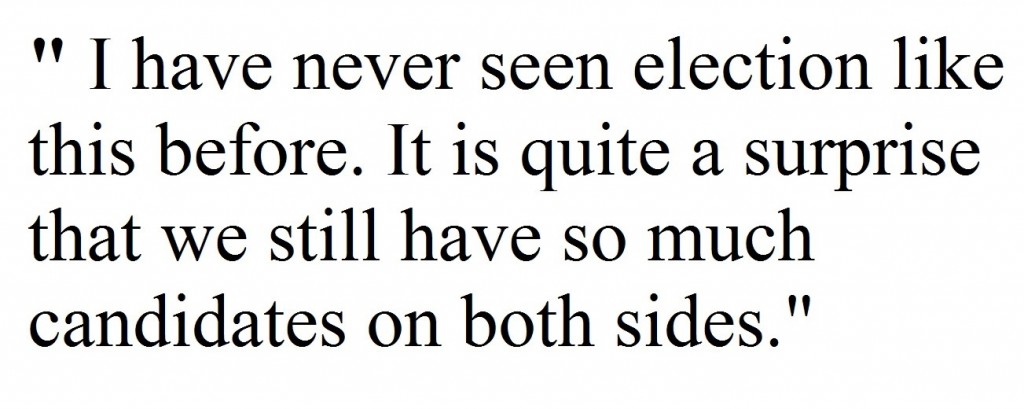 which provided health insurance for millions of Americans, signing of the Paris climate agreement and his efforts in bringing the country out of the recession. On the question about her impressions of the Slovakia’s
which provided health insurance for millions of Americans, signing of the Paris climate agreement and his efforts in bringing the country out of the recession. On the question about her impressions of the Slovakia’s
greatest successes after 1989, Ms. Fitzmaurice responded that she considers fully functioning democracy together with one of the biggest GDPs in the region as our most important successes. During the lecture students had the opportunity to vote in a poll in which they were asked: What are the biggest challenges for the U.S. Foreign Policy? Students´ answer was the instability in the Middle East and the speaker added that the main source of instability is the ISIS against which U.S., together with the broad coalition, is making some progress. She also stressed the importance of political change in Syria which would need to result in Assad leaving power. She also noted that for most of the common Americans the biggest challenge for the U.S. foreign policy would probably be the terrorism.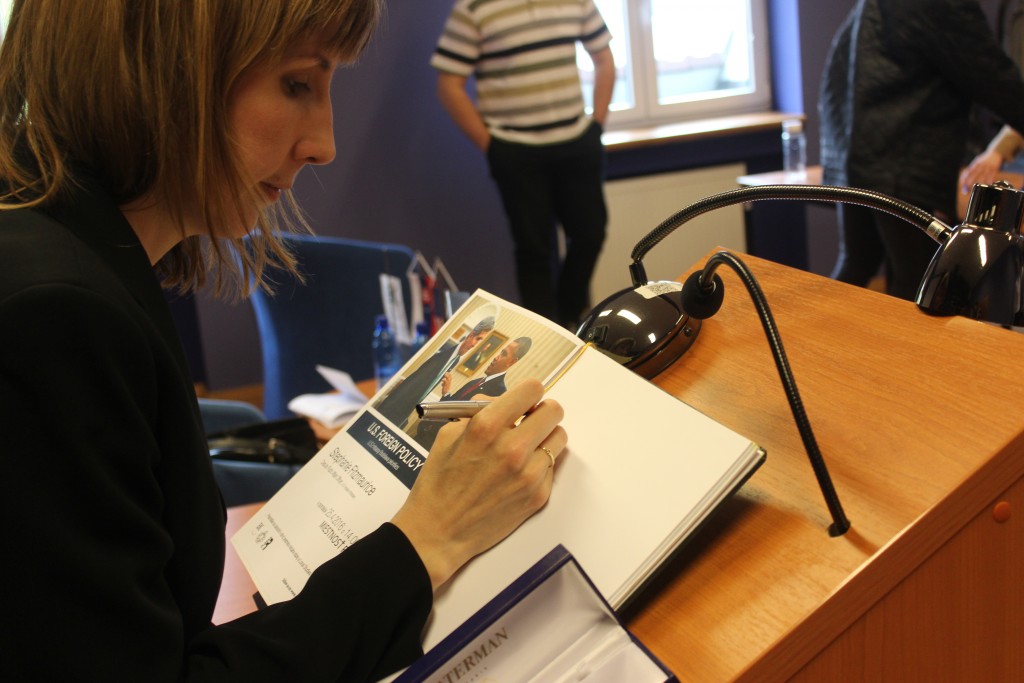
 On Monday, 25th April, Euro-Atlantic Center had the honor to host Stephanie Fitzmaurice, Deputy Public Affairs Officer from the U.S. Embassy in Bratislava, on the premises of the Faculty of political sciences and international relations in Banská Bystrica. The main topic of the given lecture was “U.S. Foreign Policy: U.S. Embassy Bratislava priorities”.
On Monday, 25th April, Euro-Atlantic Center had the honor to host Stephanie Fitzmaurice, Deputy Public Affairs Officer from the U.S. Embassy in Bratislava, on the premises of the Faculty of political sciences and international relations in Banská Bystrica. The main topic of the given lecture was “U.S. Foreign Policy: U.S. Embassy Bratislava priorities”.
At the beginning, Ms. Fitzmaurice stressed the importance of Slovakia as a partner and an ally. She explained: “I am very impressed with changes that Slovakia underwent through the years, from being a communist country through its integration to European Union and NATO into being the country with one of the highest GDPs in the region.”
 She outlined four main goals of the U.S: Embassy in Bratislava for the upcoming period. First of these goals is the support for Slovakia and its cooperation within the regional institutions. This goal also includes further assistance with the modernization of the army and Slovakia´s support for Ukraine. Their second goal is to assist Slovakia in strengthening its institutions which promote democracy, rule of law and combat corruption and propaganda. U.S. Embassy´s goal is also to support its economy growth and further integration to Euro-Atlantic structures by promoting TTIP. According to Ms. Fitzmaurice Europe and especially Slovakia could greatly benefit from this treaty. Other aspects of foreign policy that they try to promote are the combat against the climate change, assuring sufficient energy and cyber security. The fourth goal introduced by the speaker was the increasing of the active public diplomacy, by talking or giving lectures to wide public, young people and minorities.
She outlined four main goals of the U.S: Embassy in Bratislava for the upcoming period. First of these goals is the support for Slovakia and its cooperation within the regional institutions. This goal also includes further assistance with the modernization of the army and Slovakia´s support for Ukraine. Their second goal is to assist Slovakia in strengthening its institutions which promote democracy, rule of law and combat corruption and propaganda. U.S. Embassy´s goal is also to support its economy growth and further integration to Euro-Atlantic structures by promoting TTIP. According to Ms. Fitzmaurice Europe and especially Slovakia could greatly benefit from this treaty. Other aspects of foreign policy that they try to promote are the combat against the climate change, assuring sufficient energy and cyber security. The fourth goal introduced by the speaker was the increasing of the active public diplomacy, by talking or giving lectures to wide public, young people and minorities.
 After speaker´s short introduction, the host opened the discussion. One of the first questions was aimed at the different possibilities for students, such as internships or exchange programmes which U.S. Embassy has to offer. Ms. Fitzmaurice explained that they offer numerous non-paid internships all year around which are a great opportunity for students to get some valuable practical experience. She also pointed out the advantages of Work&Travel scheme which offers various summer jobs in the United States for students. Auditorium was very curious about the ongoing TTIP negotiations and the experiences of U.S. society with the GMOs. The speaker stressed that the importance of TTIP lies in its aim to increase standards of the products and not otherwise. Ms. Fitzmaurice dismissed any doubts about harmfulness of GMOs and added that in the open free market nobody will force such products unless there is a demand for them. She also notes that this treaty is very transparent compared to other trade treaties around the world, thanks to so called “reading rooms” where certain government officials are allowed to read negotiated chapters. Another broad topic that the students asked about was the upcoming U.S. elections. Our speaker commented that this year´s election have been very unpredictable and surprising so far, but expressed herself that the most probable candidate for the presidential seat would probably be Hillary Clinton. When asked about the successes of the president Obama, she pointed out the passing of Obamacare
After speaker´s short introduction, the host opened the discussion. One of the first questions was aimed at the different possibilities for students, such as internships or exchange programmes which U.S. Embassy has to offer. Ms. Fitzmaurice explained that they offer numerous non-paid internships all year around which are a great opportunity for students to get some valuable practical experience. She also pointed out the advantages of Work&Travel scheme which offers various summer jobs in the United States for students. Auditorium was very curious about the ongoing TTIP negotiations and the experiences of U.S. society with the GMOs. The speaker stressed that the importance of TTIP lies in its aim to increase standards of the products and not otherwise. Ms. Fitzmaurice dismissed any doubts about harmfulness of GMOs and added that in the open free market nobody will force such products unless there is a demand for them. She also notes that this treaty is very transparent compared to other trade treaties around the world, thanks to so called “reading rooms” where certain government officials are allowed to read negotiated chapters. Another broad topic that the students asked about was the upcoming U.S. elections. Our speaker commented that this year´s election have been very unpredictable and surprising so far, but expressed herself that the most probable candidate for the presidential seat would probably be Hillary Clinton. When asked about the successes of the president Obama, she pointed out the passing of Obamacare  which provided health insurance for millions of Americans, signing of the Paris climate agreement and his efforts in bringing the country out of the recession. On the question about her impressions of the Slovakia’s
which provided health insurance for millions of Americans, signing of the Paris climate agreement and his efforts in bringing the country out of the recession. On the question about her impressions of the Slovakia’s
greatest successes after 1989, Ms. Fitzmaurice responded that she considers fully functioning democracy together with one of the biggest GDPs in the region as our most important successes. During the lecture students had the opportunity to vote in a poll in which they were asked: What are the biggest challenges for the U.S. Foreign Policy? Students´ answer was the instability in the Middle East and the speaker added that the main source of instability is the ISIS against which U.S., together with the broad coalition, is making some progress. She also stressed the importance of political change in Syria which would need to result in Assad leaving power. She also noted that for most of the common Americans the biggest challenge for the U.S. foreign policy would probably be the terrorism.